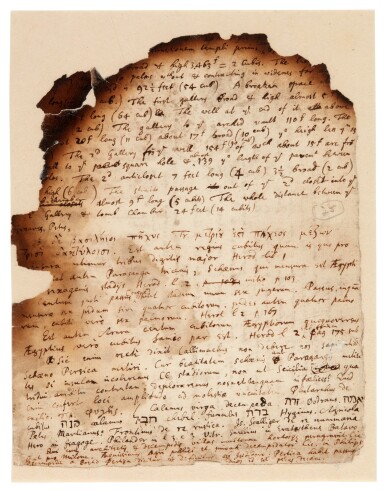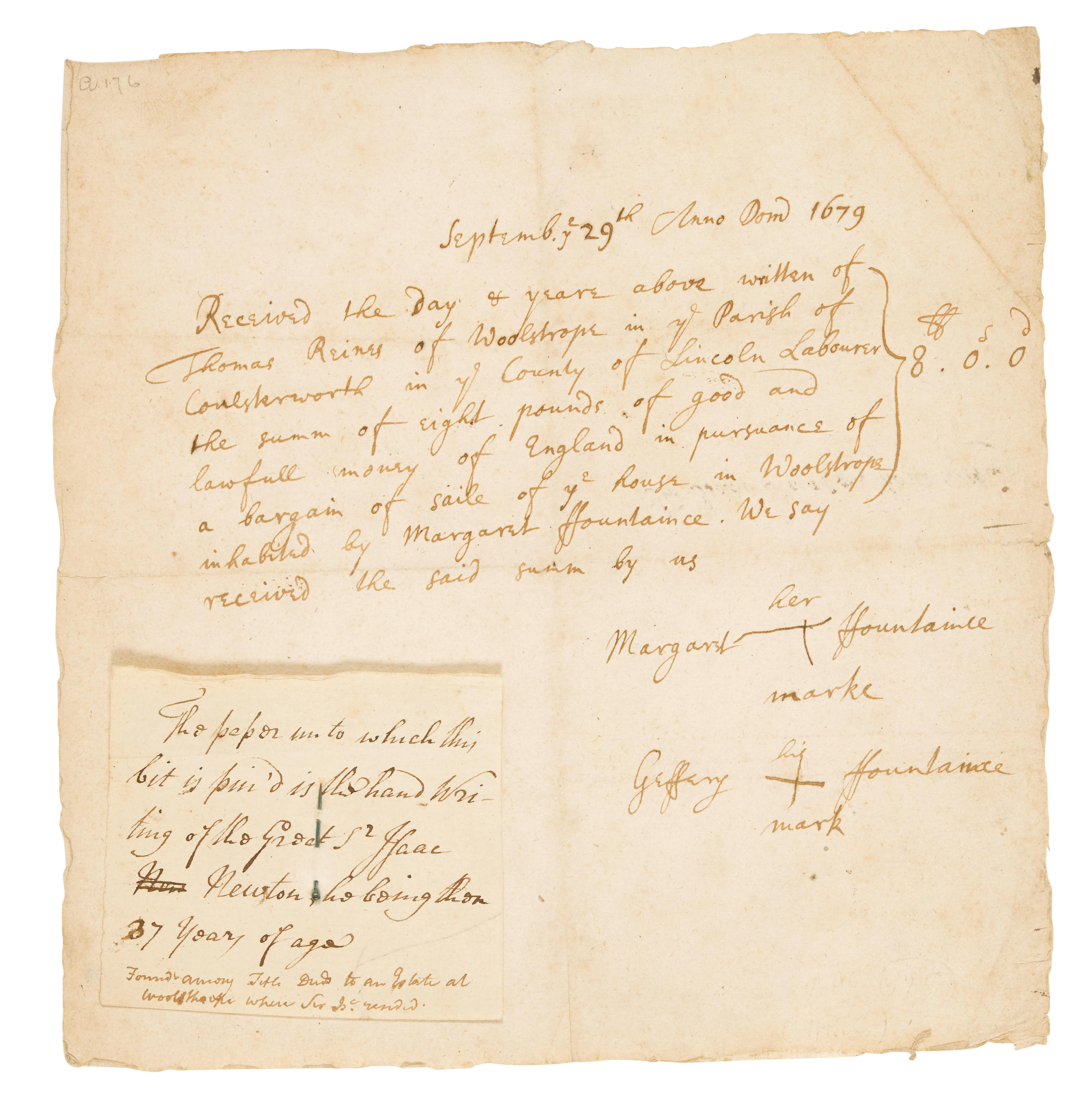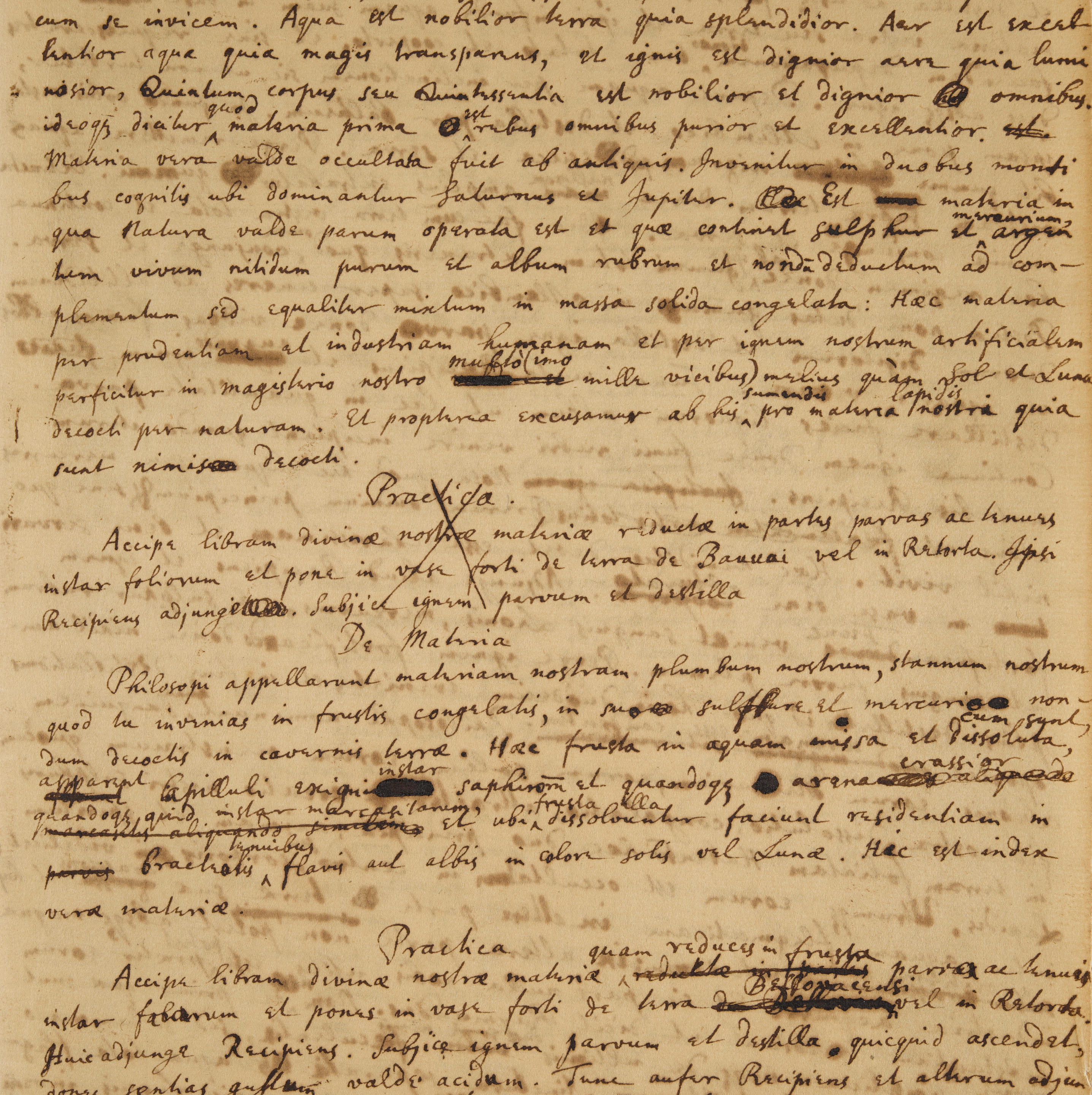NEWTON, Isaac (1642-1727). Autograph manuscript fragment, comprising part of Query 31, added to the second English edition of Opticks (published 1717), containing a reflection upon the philosophy of modern scientific inquiry as opposed to the "occult qualities" of the Aristoteleans. N.p., n.d. [ca. 1717]. 1 page, a narrow oblong slip (2 x 7½ in.). A brief but most provocative passage from Newton's visionary Queries appended to his Opticks , comprising approximately 90 words in Newton's highly compact cursive hand, with several corrections. In his Principia (1687) Newton developed his laws of universal gravitation, his greatest contribution to physics. (Over two hundred years later, Albert Einstein would become Newton's intellectual successor by his development of a theory of gravity that improved upon Newton's laws: the General Theory of Relativity.) Here, in a late addition to his Opticks , Newton draws a critical distinction between the traditional Aristotelean idea of occult qualities (forces or qualities, like gravity, which are manifest, but outside the realm of human knowledge and understanding) and the modern spirit of scientific inquiry, exemplified by Newton's own work, which held that all processes or forces in nature may be explained by man if subjected to rational observation and experimentation. As one historian writes, Newton's Opticks "became a veritable handbook for experimenters of the eighteenth century, a 'vade mecum' of the experimental art and a primary textbook for those who saw that progress in science could be made by direct questioning of nature in the laboratory. For these investigators...Newton's Opticks became the primary guide. The expanded 'Queries' introduced into the later editions came to constitute a reserach program for the century" (I. Bernard Cohen "The Principia, the Newtonian Style, and the Newtonian Revolution in Science," in Action and Reaction Proceedings of a Symposium to Commemorate the Tercentenary of Newton's Principia, ed. P. Theerman & A.F. Seef, 1993, p.75). The crucial portion of the text of Query 31 is excerpted here, with the text of the present passage italicized to illustrate the context in which it occurs: "All these things being consider'd, it seems probable to me, that God in the Beginning form'd Matter in solid, massy, hard, impenetrable Particles, of such Sizes and Figures, and with such other Properties, and in such Proportion to Space, as most conduced to the End for which he form'd them; and that these primitive Particles being Solids, are incomparably harder than any porous Bodies compounded of them; even so very hard, as never to wear or break in pieces; no ordinary Power being able to divide what God himself made one in the first Creation. While the Particles continue entirem they may compose Bodies of one and the same Nature and Texture in all Ages: But should they wear away or break in pieces, the Nature of Things depending on them, would be changed. Water and Earth, composed of old worn Particles and Fragments of Particles, would not be of the same Nature and Texture now, with Water and Earth composed of entire Particles in the Beginning. And therefore, that Nature may be lasting, the Changes of corporeal Things are to be placed only in the various Separations and new Associations and Motions of these permanent Particles; compound Bodies being apt to break, not in the midst of solid Particles, but where those Particles are laid together, and only touch in a few Points. It seems to me further, that these Particles have a Vis inertiae, accompanied with such passive Laws of Motion as naturally result from the Force, but also that they are moved by certain active Principles, such as is that of Gravity, and that which causes Fermentation, and the Cohesion of Bodies. These Principles I consider, not as occult Qualities, supposed to result from the specifick Forms of Things, but as general Laws of Nature, by which the Things themselves are form'd; their Truth appe
NEWTON, Isaac (1642-1727). Autograph manuscript fragment, comprising part of Query 31, added to the second English edition of Opticks (published 1717), containing a reflection upon the philosophy of modern scientific inquiry as opposed to the "occult qualities" of the Aristoteleans. N.p., n.d. [ca. 1717]. 1 page, a narrow oblong slip (2 x 7½ in.). A brief but most provocative passage from Newton's visionary Queries appended to his Opticks , comprising approximately 90 words in Newton's highly compact cursive hand, with several corrections. In his Principia (1687) Newton developed his laws of universal gravitation, his greatest contribution to physics. (Over two hundred years later, Albert Einstein would become Newton's intellectual successor by his development of a theory of gravity that improved upon Newton's laws: the General Theory of Relativity.) Here, in a late addition to his Opticks , Newton draws a critical distinction between the traditional Aristotelean idea of occult qualities (forces or qualities, like gravity, which are manifest, but outside the realm of human knowledge and understanding) and the modern spirit of scientific inquiry, exemplified by Newton's own work, which held that all processes or forces in nature may be explained by man if subjected to rational observation and experimentation. As one historian writes, Newton's Opticks "became a veritable handbook for experimenters of the eighteenth century, a 'vade mecum' of the experimental art and a primary textbook for those who saw that progress in science could be made by direct questioning of nature in the laboratory. For these investigators...Newton's Opticks became the primary guide. The expanded 'Queries' introduced into the later editions came to constitute a reserach program for the century" (I. Bernard Cohen "The Principia, the Newtonian Style, and the Newtonian Revolution in Science," in Action and Reaction Proceedings of a Symposium to Commemorate the Tercentenary of Newton's Principia, ed. P. Theerman & A.F. Seef, 1993, p.75). The crucial portion of the text of Query 31 is excerpted here, with the text of the present passage italicized to illustrate the context in which it occurs: "All these things being consider'd, it seems probable to me, that God in the Beginning form'd Matter in solid, massy, hard, impenetrable Particles, of such Sizes and Figures, and with such other Properties, and in such Proportion to Space, as most conduced to the End for which he form'd them; and that these primitive Particles being Solids, are incomparably harder than any porous Bodies compounded of them; even so very hard, as never to wear or break in pieces; no ordinary Power being able to divide what God himself made one in the first Creation. While the Particles continue entirem they may compose Bodies of one and the same Nature and Texture in all Ages: But should they wear away or break in pieces, the Nature of Things depending on them, would be changed. Water and Earth, composed of old worn Particles and Fragments of Particles, would not be of the same Nature and Texture now, with Water and Earth composed of entire Particles in the Beginning. And therefore, that Nature may be lasting, the Changes of corporeal Things are to be placed only in the various Separations and new Associations and Motions of these permanent Particles; compound Bodies being apt to break, not in the midst of solid Particles, but where those Particles are laid together, and only touch in a few Points. It seems to me further, that these Particles have a Vis inertiae, accompanied with such passive Laws of Motion as naturally result from the Force, but also that they are moved by certain active Principles, such as is that of Gravity, and that which causes Fermentation, and the Cohesion of Bodies. These Principles I consider, not as occult Qualities, supposed to result from the specifick Forms of Things, but as general Laws of Nature, by which the Things themselves are form'd; their Truth appe








.jpg)

.jpg)



.jpg)
Testen Sie LotSearch und seine Premium-Features 7 Tage - ohne Kosten!
Lassen Sie sich automatisch über neue Objekte in kommenden Auktionen benachrichtigen.
Suchauftrag anlegen